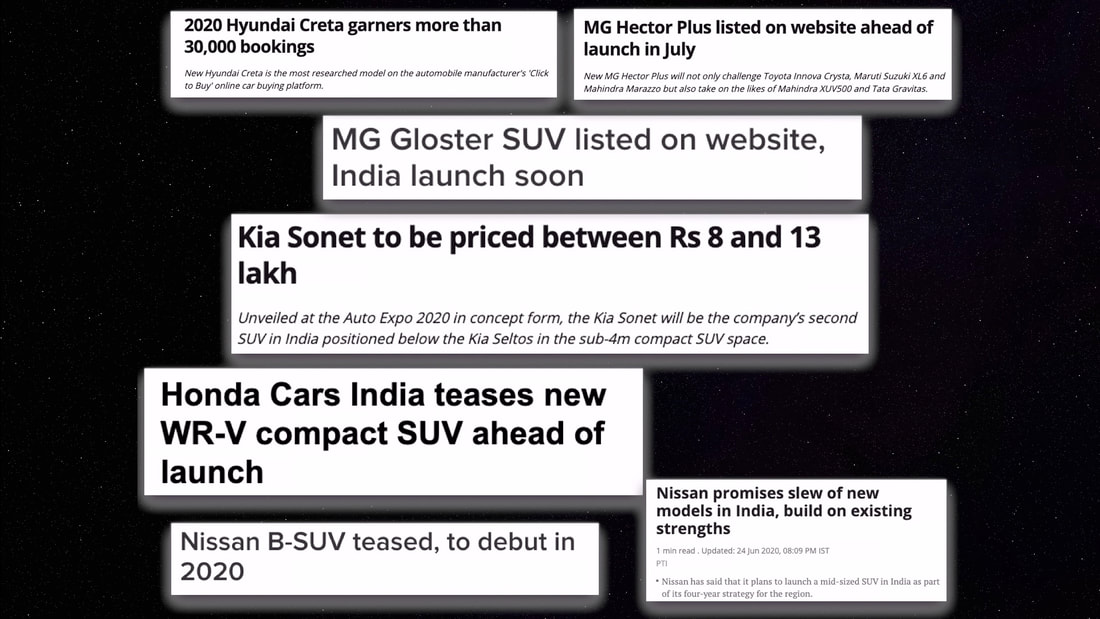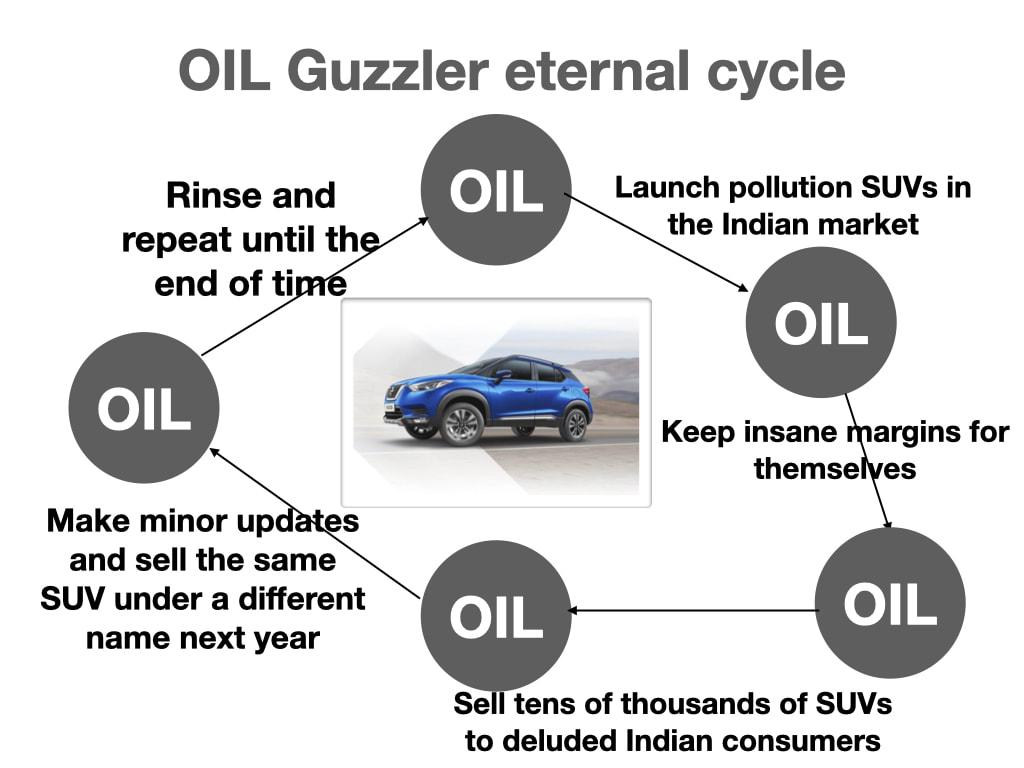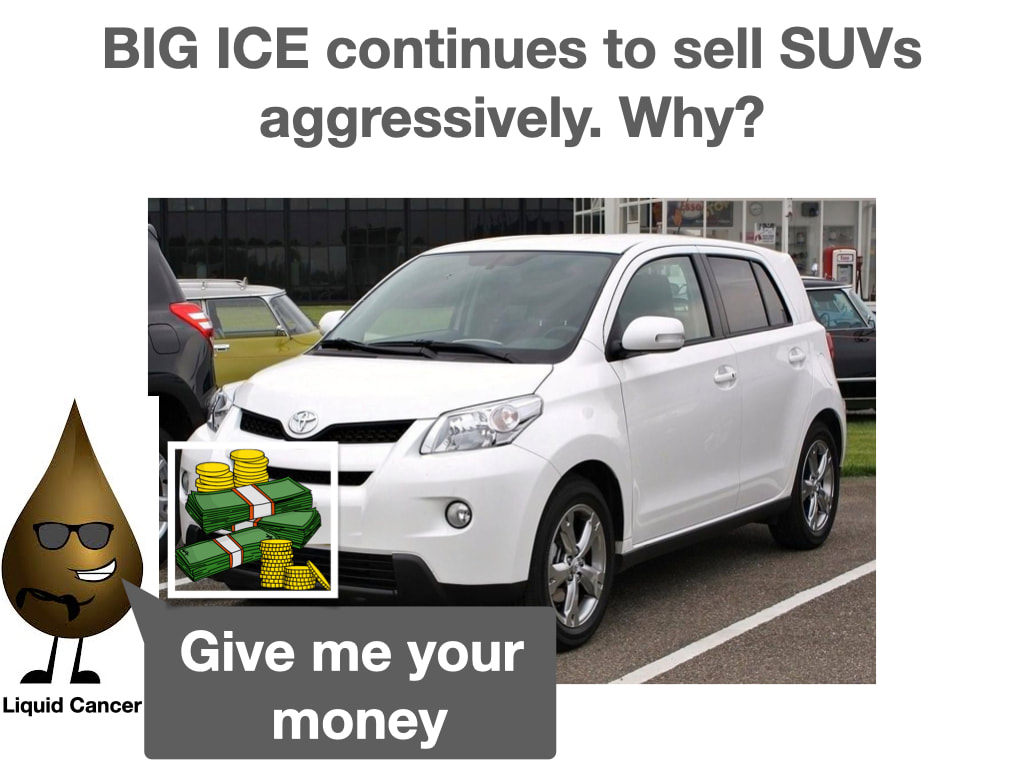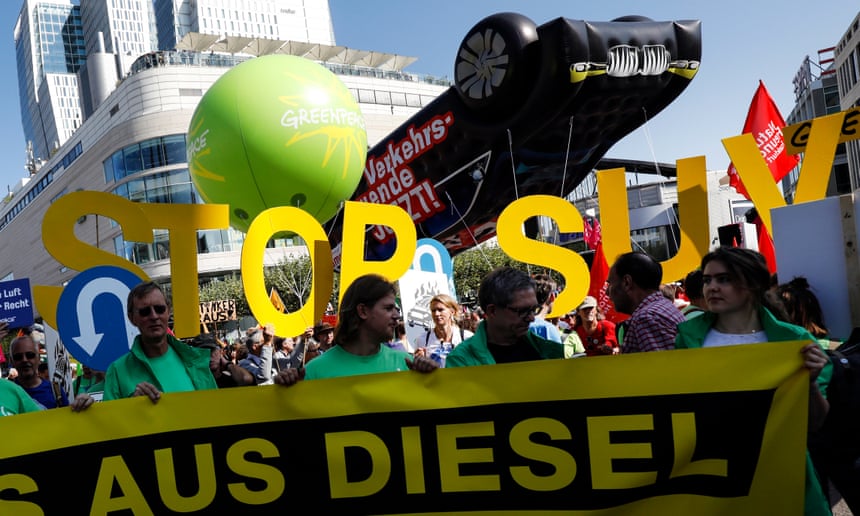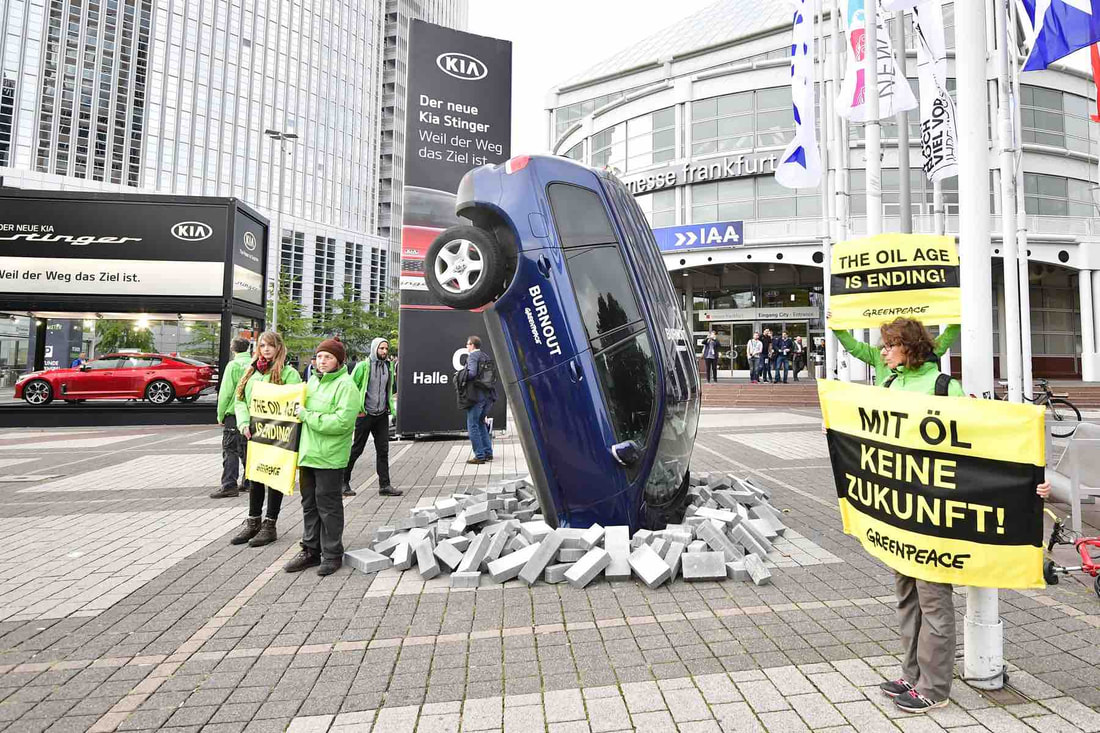SUV’s running on Internal Combustion Engines(ICE) consume more oil and generate more pollution than small cars. For decades, there have been movements all over the world to highlight the flaws of SUVs and to limit their production.
Unfortunately, car makers all around the world and in India continue to aggressively market these vehicles. Why?
Join us in this hard hitting article/podcast that calls out Indian and MNC automakers who don't care about the air pollution in Indian cities or about India’s oil import bills.
For the CEOs and investors in the pollution vehicle industry, it's business as usual.
Unfortunately, car makers all around the world and in India continue to aggressively market these vehicles. Why?
Join us in this hard hitting article/podcast that calls out Indian and MNC automakers who don't care about the air pollution in Indian cities or about India’s oil import bills.
For the CEOs and investors in the pollution vehicle industry, it's business as usual.
Video Podcast : Does India need more oil guzzling 'pollution' SUVs?
Introduction
Sport Utility Vehicles or, more popularly, SUVs. What a name. People sit inside these large monstrosities to gaze down condescendingly at the unwashed masses, giving them an unearned sense of security and boosting their already overinflated egos. SUV’s consume more oil and generate more pollution than small cars. For decades, there have been movements all over the world to highlight the flaws of SUVs and to limit their production.
Unfortunately, car makers all around the world and in India continue to aggressively market these vehicles. Why? Because selling SUVs is highly profitable for these manufacturers.
And BIG oil is jubilant as more and more of their liquid cancer is consumed by hundreds of thousands of SUV owners.
And in India, with more people able to afford large SUVs today, this problem is becoming a nightmare as her cramped roads are gridlocked and battered and her air quality goes from bad to toxic gas chamber thanks to these oversized tanks. So the pressing question is, should we impose a ban on petrol and diesel SUVs?
Sport Utility Vehicles or, more popularly, SUVs. What a name. People sit inside these large monstrosities to gaze down condescendingly at the unwashed masses, giving them an unearned sense of security and boosting their already overinflated egos. SUV’s consume more oil and generate more pollution than small cars. For decades, there have been movements all over the world to highlight the flaws of SUVs and to limit their production.
Unfortunately, car makers all around the world and in India continue to aggressively market these vehicles. Why? Because selling SUVs is highly profitable for these manufacturers.
And BIG oil is jubilant as more and more of their liquid cancer is consumed by hundreds of thousands of SUV owners.
And in India, with more people able to afford large SUVs today, this problem is becoming a nightmare as her cramped roads are gridlocked and battered and her air quality goes from bad to toxic gas chamber thanks to these oversized tanks. So the pressing question is, should we impose a ban on petrol and diesel SUVs?
| Non Stop launches of SUVs in India Look at all the pollution SUVs being launched in India. Most of these large SUVs are being launched by MNCs such as Toyota, Nissan, Honda, MG Motors, and Hyundai. And our Indian auto behemoths are not far behind. Mahindra, the king of Indian SUV manufacturers, launched the Marazzo SUV recently. Tell me, why does Mahindra need another large oil guzzler in their portfolio? They have the XUV, TUV, and KUV, so why another model? I just don’t get it. Consider this: the Maruti Wagon R, which was a decent-sized hatchback, has been ‘beefed’ up in its latest version, going from compact to large size? Same with Hyundai i10. The ICE vehicle industry seems hell bent on creating inefficient large pollution cars that consume more oil. |
Many of these MNCs and Indian auto giants don't care about the air pollution in Indian cities or about India’s oil import bills.
For the CEOs and investors in the pollution vehicle industry, its business as usual.
This is what they do:
It’s absolutely depressing to learn that Kia Motors sold 85,000 Seltos SUVs last year alone.
Just think about it. 85,000 individuals who, 90% of the time will drive their SUVs alone or with 1 or 2 people onboard, consuming hundreds of thousands of litres of oil every year.
The cumulative environmental impact is incalculable.
For the CEOs and investors in the pollution vehicle industry, its business as usual.
This is what they do:
- Launch pollution SUVs in the Indian market
- Keep insane margins for themselves
- Sell tens of thousands of SUVs to hapless, deluded Indian consumers
- Make minor updates and sell the same SUV under a different name next year
- Rinse and repeat until the end of time
It’s absolutely depressing to learn that Kia Motors sold 85,000 Seltos SUVs last year alone.
Just think about it. 85,000 individuals who, 90% of the time will drive their SUVs alone or with 1 or 2 people onboard, consuming hundreds of thousands of litres of oil every year.
The cumulative environmental impact is incalculable.
Flaws of SUVs
SUVs have major issues:
Worldwide Protests against the ICE car lobby & SUVs
There have been movements across the world protesting against SUVs. These protests highlight how pollution car manufacturers showcase their shiny large cars and SUVs in motor shows without feeling any remorse or guilt about the damage these monstrosities are causing to the planet.
For example, at the Frankfurt Motor show in 2019, thousands descended onto the streets of Frankfurt on a Saturday to protest against the role of Germany's car industry in increasing pollution. The protesters called for an end to combustion engines and a transfer towards emissions-free vehicles.
Do we need to hold such protests in our auto expos too? I would say ‘YES’ as Indian car manufacturers and MNC’s show little concern for the environment and anything for their bottomline.
SUVs have major issues:
- They require numerous resources to manufacture
- They consume more oil than small cars
- They emit massive quantities of greenhouse gases, severely affecting our cities’ air quality
- Statistically, SUVs are less safe than regular cars, both for people inside the car and pedestrians outside.
- Studies show they lull drivers into a false sense of security, encouraging them to take greater risks. I’ve linked a research article about this in the video description.
- Their height makes them twice as likely to roll in crashes and to kill pedestrians by inflicting greater upper body and head injuries. You don’t need to be a rocket scientist to figure out that a collision with, say, a Honda Brio will likely put you in the hospital, but a collision with a Mahindra XUV 500 will almost certainly buy you a one-way ticket to the great highway in the sky
- The less we speak about SUVs’ efficiency and economy, the better.
Worldwide Protests against the ICE car lobby & SUVs
There have been movements across the world protesting against SUVs. These protests highlight how pollution car manufacturers showcase their shiny large cars and SUVs in motor shows without feeling any remorse or guilt about the damage these monstrosities are causing to the planet.
For example, at the Frankfurt Motor show in 2019, thousands descended onto the streets of Frankfurt on a Saturday to protest against the role of Germany's car industry in increasing pollution. The protesters called for an end to combustion engines and a transfer towards emissions-free vehicles.
Do we need to hold such protests in our auto expos too? I would say ‘YES’ as Indian car manufacturers and MNC’s show little concern for the environment and anything for their bottomline.
Indian ICE Vehicle media continue to promote SUVs
Another big problem is that our ICE-vehicle-centric media happily promotes these dangerous cars.
The people running auto websites and magazines seem so excited whenever a pollution SUV is launched in India.
But the ICE-centric media still happily promotes these vehicles.
What about electric SUVs?
An electric SUVs consumes more energy than a small electric hatchback. For example, the Tesla Model X has an efficiency of around 200 Wh/km compared to my Mahindra e2o, which averages around 75 wH/km in my city, Pune.
But an electric SUV is still far more efficient at using energy compared to a diesel or petrol SUV because of its electric motor. And don’t forget, as more solar, wind, and hydro power plants proliferate, your electric SUV will only become greener.
Another big problem is that our ICE-vehicle-centric media happily promotes these dangerous cars.
The people running auto websites and magazines seem so excited whenever a pollution SUV is launched in India.
- Look at this MotorOctane article headline -
Mahindra Marazzo Petrol Engine Expected Soon!
MotorOctane seems excited for another large SUV launch.
- Now Look at this article by Times Group
Nissan India teases the much awaited B-SUV
Much awaited by whom exactly? Times Group? Nissan shareholders? Batman? - Remember I said that automakers make minor updates to an existing vehicle and sell it as a new vehicle next year?
Now look at this headline from an India Today article. The MG Hector Plus listed on MG website ahead of launch in July
So MG Motors is essentially “launching” an upgrade as a new SUV, attracting more gullible buyers.
But the ICE-centric media still happily promotes these vehicles.
What about electric SUVs?
An electric SUVs consumes more energy than a small electric hatchback. For example, the Tesla Model X has an efficiency of around 200 Wh/km compared to my Mahindra e2o, which averages around 75 wH/km in my city, Pune.
But an electric SUV is still far more efficient at using energy compared to a diesel or petrol SUV because of its electric motor. And don’t forget, as more solar, wind, and hydro power plants proliferate, your electric SUV will only become greener.
Auto OEM's need to be regulated
We have some 20 major auto manufacturers selling thousands of SUVs each year in India. All of them need to be subjected to checks and balances for the good of the environment and the economy.
If the above is not done, then MNC after MNC will enter the Indian market to dump their oil-guzzling SUVs on us.
Ultimately by not launching electric cars in India, the ICE vehicle manufacturers stand to gain as there is less awareness among people and they can continue to keep selling their pollution cars in the Indian market.
Another awful tactic these ICE car manufacturers do is to inflate the price of electric cars and keep production volumes low. This is happening all over the world.
For example Opel launched their Opel Corsa-e electric car in Europe. This car has a 45 kWh battery pack. We all know the costs of the battery pack which comes to around 6000 Euros.
They are selling the car at around 30,000 Euros. Which seems totally inflated to me.
Same thing happened with the Mahindra e2o Plus launch in 2016 in India. The price of the P8 14 kWh version of the e2o Plus was inflated to 11 Lakhs, when we all knew the cost of the battery.
Ultimately these ICE vehicle manufacturers don't want to show the world that electric cars can be affordable. If they price electric cars in a fair manner, then no one will buy their petrol cars.
Do you see the horrible games being played here with the people and our planet?
India needs dedicated OEMs who only sell electric cars, especially small electric cars. That is why we support pure EV startups like Strom and that is why we need Tesla to come to India soon.
Currently, pollution car OEMs face no pressure either in the form of regulations or in terms of competition. It is only when they face a serious threat from a committed electric car maker that they will wake up and smell the coffee.
We have some 20 major auto manufacturers selling thousands of SUVs each year in India. All of them need to be subjected to checks and balances for the good of the environment and the economy.
- First, there need to be limits on how many SUVs they can sell each year.
- Second, each sale of a large SUV should be penalised with a carbon tax by both state and central governments.
- Third, local RTOs can change the type of licence needed to drive SUVs. Make it harder to get one.
- Finally, if a manufacturer sells an oil guzzling pollution SUV in India, ensure that they offer at least three electric car options in its portfolio as well.
This will encourage more people to go for an electric car.
If the above is not done, then MNC after MNC will enter the Indian market to dump their oil-guzzling SUVs on us.
- For example - Great Wall Motors - a large Chinese OEM has recently entered the Indian market. It’s making a lot of noise about the small ORA-100 electric car and they claim that they are launching in India. We sincerely hope they do. But we also know the real reason the company’s here: to sell its highly profitable large SUVs.
- Then there is Volkswagen. They have some decent electric cars in the European market, such as the e-Up and e-Golf. They are launching the ID.3 electric compact car in Europe soon as well. But they continue to pretend that the Indian electric car market doesn’t exist. Ultimately, they are here in India to sell their oil-guzzling SUVs and other pollution cars.
- Nissan. They have an electric car called the Leaf, which has been doing fantastic all over the world for more than 10 years. But then they absolutely don't want to launch the Leaf in India.
Ultimately by not launching electric cars in India, the ICE vehicle manufacturers stand to gain as there is less awareness among people and they can continue to keep selling their pollution cars in the Indian market.
Another awful tactic these ICE car manufacturers do is to inflate the price of electric cars and keep production volumes low. This is happening all over the world.
For example Opel launched their Opel Corsa-e electric car in Europe. This car has a 45 kWh battery pack. We all know the costs of the battery pack which comes to around 6000 Euros.
They are selling the car at around 30,000 Euros. Which seems totally inflated to me.
Same thing happened with the Mahindra e2o Plus launch in 2016 in India. The price of the P8 14 kWh version of the e2o Plus was inflated to 11 Lakhs, when we all knew the cost of the battery.
Ultimately these ICE vehicle manufacturers don't want to show the world that electric cars can be affordable. If they price electric cars in a fair manner, then no one will buy their petrol cars.
Do you see the horrible games being played here with the people and our planet?
India needs dedicated OEMs who only sell electric cars, especially small electric cars. That is why we support pure EV startups like Strom and that is why we need Tesla to come to India soon.
Currently, pollution car OEMs face no pressure either in the form of regulations or in terms of competition. It is only when they face a serious threat from a committed electric car maker that they will wake up and smell the coffee.
Do you really need that SUV?
As a consumer, evaluate if you really need a large SUV. Sure, Indian people live in large family groups and want large cars. But how many times in a month, or even two months, does the entire family travel together in the car? I’ve lost count of the number of times I’ve seen individuals driving alone in an SUV in cities across India. Why do they need a large SUV if they’re driving alone 90% of the time? Just to feel good about themselves? Are the environment and the economy sacrificial lambs to be slaughtered on the altar of feel-good mercenary capitalism?
Tell us what you think in the comments. Do you agree that OEMS in India need to be reigned in when it comes to selling SUVS?
Do you agree that people need to take a hard look at themselves and their needs when they are thinking of buying an SUV?
Things cannot go on like this. If they do, we are staring at a not-too-distant future where our roads are gridlocked and getting anywhere takes four hours, where our cities are covered by a permanent layer of smog and we have to wear masks ALL the time, and where oil countries have us in a vice grip because of our massive oil bills. We need to make some serious changes now, and we have all the tools we need. Buy electric, drive electric, save the environment, and the economy.
As a consumer, evaluate if you really need a large SUV. Sure, Indian people live in large family groups and want large cars. But how many times in a month, or even two months, does the entire family travel together in the car? I’ve lost count of the number of times I’ve seen individuals driving alone in an SUV in cities across India. Why do they need a large SUV if they’re driving alone 90% of the time? Just to feel good about themselves? Are the environment and the economy sacrificial lambs to be slaughtered on the altar of feel-good mercenary capitalism?
Tell us what you think in the comments. Do you agree that OEMS in India need to be reigned in when it comes to selling SUVS?
Do you agree that people need to take a hard look at themselves and their needs when they are thinking of buying an SUV?
Things cannot go on like this. If they do, we are staring at a not-too-distant future where our roads are gridlocked and getting anywhere takes four hours, where our cities are covered by a permanent layer of smog and we have to wear masks ALL the time, and where oil countries have us in a vice grip because of our massive oil bills. We need to make some serious changes now, and we have all the tools we need. Buy electric, drive electric, save the environment, and the economy.

